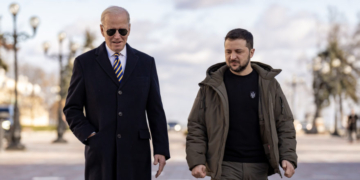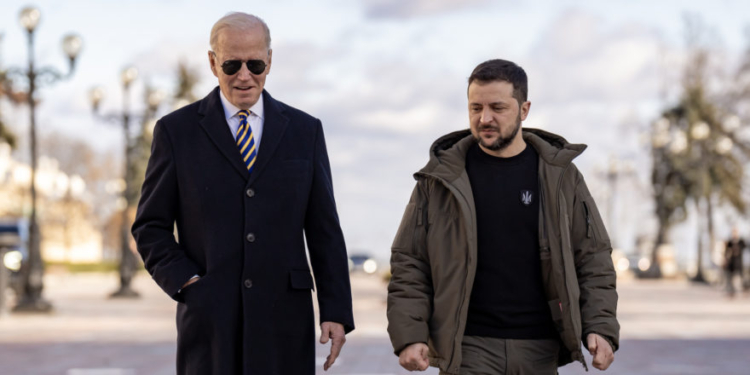The U.S. Embassy in Ukraine abruptly shut down Wednesday over concerns that a “significant” aerial attack was inbound.
Embassy staff were told to shelter in place for the time being, and U.S. citizens in the area were warned to take precautionary measures should air raid alarms sound, according to a statement from the embassy. The lockdown comes one day after Ukraine fired U.S.-provided long-range missiles into Russia, marking a first for the war and raising concerns of a severe escalation in the conflict.
“The U.S. Embassy in Kyiv has received specific information of a potential significant air attack on November 20,” the embassy said in a statement, further advising civilians in the area to “Monitor local media for updates … Identify shelter locations in advance of any air alert … Immediately take shelter if an air alert is announced [and] Follow the directions of Ukrainian officials and first responders in the event of an emergency.”
The Biden administration’s decision to allow Ukraine to use U.S.-provided long-range missiles against Russia is unprecedented; the administration up until this point has been hesitant to let Kyiv do so because it could prompt Russia to respond erratically while failing to provide Kyiv with any tangible strategic advantage. Ukraine fired its first salvo of long-range missiles into the Bryansk region of Russia on Tuesday, hitting weapons depots.
Moscow warned Monday that the Biden administration’s decision to let Ukraine act in such a way marks a “new round of tension” in the war. Russian President Vladimir Putin updated the country’s nuclear doctrine Tuesday, effectively lowering the standard for the conditions in which nuclear weapons can be used.
The White House brushed off Russia’s warnings, telling the Daily Caller News Foundation Tuesday that it was “more of the same irresponsible rhetoric from Russia, which we have seen for the past two years.”
A number of national security experts expressed confusion and concern this week over Biden’s decision to let Ukraine use U.S. weapons in a potentially escalatory matter.
“There’s no benefit from a U.S. national security perspective. Heightened proxy attacks inside Russia only elevate risk with Russia and will make the war harder to wind down,” author and international security professor Max Abrahams said on Monday.
All content created by the Daily Caller News Foundation, an independent and nonpartisan newswire service, is available without charge to any legitimate news publisher that can provide a large audience. All republished articles must include our logo, our reporter’s byline and their DCNF affiliation. For any questions about our guidelines or partnering with us, please contact [email protected].



























 Continue with Google
Continue with Google